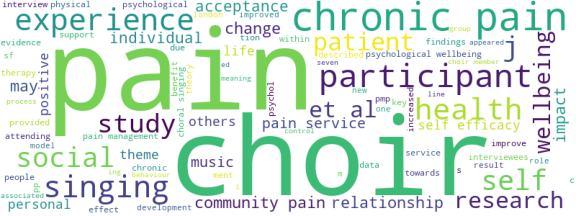| Id | 776 | |
| Author | Hopper M.J., Curtis S., Hodge S., Simm R. | |
| Title | A qualitative study exploring the effects of attending a community pain service choir on wellbeing in people who experience chronic pain | |
| Reference | Hopper M.J., Curtis S., Hodge S., Simm R.; A qualitative study exploring the effects of attending a community pain service choir on wellbeing in people who experience chronic pain ;British Journal of Pain vol:10.0 issue: 3 page:124.0 |
|
| Link to article | https://www.scopus.com/inward/record.uri?eid=2-s2.0-85006190137&doi=10.1177%2f2049463716638368&partnerID=40&md5=3385f0b24372bc05113231bf599b18b2 |
|
| Abstract | In line with growing evidence of the health benefits of singing, this study aimed to explore participants’ perceptions of the impact of a service-user-led community pain choir on their psychological wellbeing, self-efficacy and relationships with their chronic pain. The choir has links to a multidisciplinary pain management service, which is informed by the ethos of solution-focused (SF) principles, specifically in identifying and drawing upon patients’ resources. Seven choir members participated in semi-structured interviews, grounded in lines of enquiry commonly used in SF practice. Thematic analysis of the data uncovered seven themes: Physical Improvements, Emotional Impact, Personal Growth, Interpersonal Processes, Relationship with the ‘Self’, Living Well with Pain and Sharing the Music and Spreading the Word. Participants’ narratives provided support for participation in the choir in enhancing positive affect, self-worth, interpersonal relationships and overall wellbeing. The choir enabled continued progress towards accomplishing key pain management programme aims: self-management, coping and living well with pain. Findings expanded upon existing evidence relating to singing and wellbeing by highlighting the choir’s role in promoting resilience and acceptance of pain. Clinical implications are explored in relation to psychosocial dimensions of pain. © 2016, © The British Pain Society 2016. |
|
| Keywords | choir; Chronic pain; pain management programme; psychological wellbeing; qualitative research; self-efficacy; singing; solution-focused approaches |
Wordcloud:



